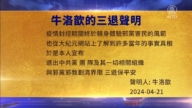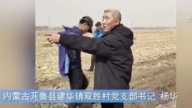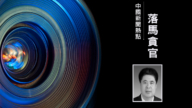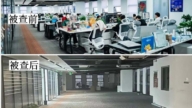【新唐人2013年08月19日訊】中共黨刊《求是》雜誌最近發表文章,直白入骨的承認,媒體不能實行西方的新聞體制,也不能實現媒體自由,必須為黨服務。同時,文章還以抹黑西方新聞自由的方式為自己開脫。文章更自爆,在現階段,中國承受不了輿論失控的後果。那麼,中共為何強調媒體必須服從黨性,大陸媒體為甚麼不自由?《求是》是如何進行狡辯的,請看報導。
《求是》雜誌社長李寶善,在標題為《自覺堅持馬克思主義新聞觀》這篇文章中承認,西方新聞觀強調新聞的一般屬性。馬克思主義新聞觀則強調新聞的黨性。中國為甚麼不能實行西方的新聞體制?答案其實很簡單:中國是社會主義國家。
大陸長城抗戰網主編 賈元良:「大陸對於新聞自由一直都是有控制的,而且會根據不同的政治氛圍,管理的制度都是不一樣的,我都能感覺到。國內最近發生了一些事件,言論語言民眾抱怨比較多,對於言論的控制,他們有些人認為會危及到中共的領導權。」
旅居德國的政治評論家仲維光指出,中國各階層都對中共限制新聞自由存在不滿,但新聞自由還是要靠民眾自己不斷去抗爭才能實現。
大陸長城抗戰網主編賈元良認為,現在中國社會矛盾極其尖銳,互聯網的發展使得中共沒辦法完全控制信息。
李寶善在文章中還提到,過度批評會損害政府威信、妨害施政﹔中國在現階段,承受不了輿論失控的後果。他還大肆稱讚,中共要求的「新聞媒體堅持正面宣傳為主」所謂方針。
時事評論員 藍述:「為共產黨這個集團服務,為它取說好話,這是它對『積極』的定義,這個只有它自己承認的。如果它今天開放了,如果它確實真的在為中國社會積極正面的報導,那它為甚麼害怕競爭呢,從另外一個角度說明中共這個政權有多脆弱,只能靠假話來維持。」
曾經去過台灣旅遊的中國民眾都知道,台灣各種媒體讓人應接不暇,卻沒有像嚴格控制媒體的大陸社會亂相百出。
李寶善還用國外是「私人辦媒體,資本壟斷」來為中國的媒體環境不自由開脫。他聲稱,「社會主義國家不會允許新聞媒體私有化」,這是與資本主義新聞體制的所謂區別。
藍述:「西方媒體它處在一個自由競爭的環境裏,它如果不代表主流民意的話,它在市場上很快就被淘汰,相反在中國,在中共極權的壟斷之下,它本身就代表了少數的集團,今天世界上任何一個國家裏,還能找到比中共更壟斷的集團嗎?」
李寶善企圖用「默多克的新聞集團也控制了很多媒體」的例子,為中共控制媒體進行辯解,宣揚「西方獨立媒體可以獨立於政府、獨立於政黨,卻不可能獨立於資本。」事實上,默多克的新聞集團並不是靠資本或資本家辦起來的
默多克出生於澳大利亞墨爾本郊外的一個農場。默多克的父親是一名戰地記者,自己辦一份小報,逐漸擴大。 1952年,默多克父親死於心臟病時,正在英國牛津大學讀書的默多克趕回家中處理後事,發現父親的報紙處於虧損狀態,於是他設法保留住了《星期日郵報》(Sunday Mail)和《新聞報》(The News),通過與自己的主要競爭對手合併,才使《新聞報》開始盈利。一年之內發行量就翻了兩翻。
中國問題專家 趙遠明:「西方媒體可以問責政客,指責政黨,批評政府,都是由於它實話實說,這就使西方媒體逐漸做大,不斷擴大讀者群。」
移民澳大利亞的中國問題專家趙遠明指出,中共即使極盡全力,也很難完全控制信息和維持政權,但是李寶善的這番言論,折射出中共刁難耍賴的流氓本質。
採訪編輯/劉惠 後製/葛雷
State-owned Media Attack Press Freedom with No Misgivings
Qiushi Journal, an organ of the Chinese Communist Party
(CCP), recently published an article boldly saying that
China cannot adopt the media systems of western countries
and freedom of the press, as all media must serve the party.
The article also attempts to discredit western media to
defend its argument.
It even admits that China (the CCP regime) is unable to
handle the consequences of uncontrolled media.
Why does the CCP always want the media to bend at its will?
Why is there no freedom for mainland China’s media?
How has Qiushi Journal justified its theory?
Let’s see the report below.
Li Baoshan, president of Qiushi Journal, is the author of
the article titled
“News media should consciously stick to Marxist ideology”.
Li admits in the article that, western media lay stress on
normal nature of news,
while Marxism regards party nature
of news as the most important.
Why is China unable to implement a western media system?
The answer is indeed a simple: China is a socialist country.
Jia Yuanliang, chief editor of the Great Wall War website:
“China has always had control over the freedom of the media.
I notice that they also adjust the degree of media control
according to different political climates.
Some domestic incidents that have recently occurred have
led to a lot of complaints from Chinese civilians.
Some party members believe that the issue of media control
may threaten the party’s rule.”
Zhong Weiguang, a political commentator living in Germany,
says that, in one way or another, people at all levels of
Chinese society are dissatisfied with the CCP’s media control;
however, press freedom depends on the people continuing to
take a stand over the long run in order to realize this freedom.
Jia Yuanliang says that the social conflicts inside of
China have become extremely intense.
Even in such a situation, the growth in internet use has
made it impossible for the party to implement complete information control.
Li’s article also says that “excessive criticism” may damage
the government’s credibility and result in impediment of administrations.
It claims that in the current stage, China isn’t able to
take the consequences of uncontrolled media.
Li also applauded the party’s so-called media principle
of “reporting its news mostly in a positive way”.
Lan Shu, political commentator: “The CCP’s definition of a
『positive way’ is that which serves its interest group and that which glorifies the party.
This is accepted by nobody but the CCP itself.
If we remove the media control today, why should they
be afraid of market competition if their media have been
reporting the truth of China in a positive way?
This proves from another angle that the CCP’s regime is
so fragile that it can only be maintained by lies.”
All Chinese who once visited Taiwan should know that,
although Taiwan has many media with different styles,
it’s nothing like the chaotic state that has emerged
among the media in China’s strictly-controlled mainland.
In his article, Li Baoshan also attempts to justify China’s
media environment by claiming “western media are private but capital-monopolized”.
Li said, “a socialist country can’t allow privatized media”,
and that this marks the supposed difference
between media system of socialist and capitalist countries.
Lan Shu: “Western media are subject to free competition.
If failing to agree with mainstream opinions, they will be
eliminated from the market very soon.
In China it’s the opposite. Under the CCP’s dictatorship
and monopoly of political power, it only represents a very small minority of Chinese society.
In any country in the world today, is there a monopoly
greater than the CCP?”
Additionally, Li’s tried to justify the CCP’s media
control policy by saying,
“Rupert Murdoch’s News Corporation
also has control over a lot of media.”
It argues that “western media can be independent of
government or political parties, but they are never independent of capital.”
But in fact, Murdoch’s News Corporation
wasn’t initially founded upon capital or by capitalists.
Murdoch was born in a country farm in Melbourne, Australia.
His father is a war correspondent who later founded
a newspaper and developed it.
When his father died of heart disease in 1952, Murdoch,
who was studying at the University of Oxford,
returned home for funeral affairs.
At that time he found that his father’s newspapers
were in deficit.
Afterwards, Murdoch managed to carry on
Sunday Mail and The News,
and finally make benefits from The News
by merging with his main competitors.
In a year, the circulation of his newspaper had doubled twice.
Zhao Yuanming, China affairs expert: “Western media
can call for the accountability of politicians, and criticize
political parties or governments.
It’s only by reporting the truth to the public that western media
have gradually developed and expanded their audiences.”
Zhao Yuanming commented that, even at its full strength,
the CCP could still hardly implement complete information
control to maintain its governance.
Despite this, Li Baoshan’s article has clearly reflected
the CCP’s unscrupulous nature of distorting the truth by speaking deceptively.




























